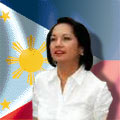Can People Power Make President Taylor Go?
By Wollor Topor
Munoz, Philippines
The Perspective
Jan 22, 2001
As the saying goes heaven helps those who help themselves.
Can Liberians organize people power to let Taylor go? The answer
here is not as simple as a ripe banana; however, hope is not lost.
From  what I observed during the past
few days here in the Philippine "People Power II", where
close to a million people gathered at the EDSA Shrine to demand
the resignation of their President due to alleged corruption charges;
and at the end the will of the people prevailed. The now former
president, Joseph Estrada, was stripped of power by the Supreme
Court thereby paving the way for Gloria Macapagal Arroyo (former
vice-president) who took over as the new president. The Secretary
General of the United Nations, Kofi Annan, calls it " victory
for democracy". The bloodless transfer of power indicates
to me that democracy can thrive under poverty but not ignorance.
what I observed during the past
few days here in the Philippine "People Power II", where
close to a million people gathered at the EDSA Shrine to demand
the resignation of their President due to alleged corruption charges;
and at the end the will of the people prevailed. The now former
president, Joseph Estrada, was stripped of power by the Supreme
Court thereby paving the way for Gloria Macapagal Arroyo (former
vice-president) who took over as the new president. The Secretary
General of the United Nations, Kofi Annan, calls it " victory
for democracy". The bloodless transfer of power indicates
to me that democracy can thrive under poverty but not ignorance.
What is people power? It can be conceptualized as a movement comprising
of Liberians with the purpose and philosophy and willful commitment
to bring about social justice and economic gains based on the
strength of voluntary action by Liberians to satisfy their social
and economic needs with a multiplying effect on Liberia. Can Liberians
exercise people power? As stated earlier such power can never
flourish under ignorance, it takes knowledge to build the interest
in the hearts and minds of the Liberian people and this is absent
within the country.
Additionally, the old age process of centralization in the
Liberian local government system has provided little room for
Liberian taxpayers participation in national issues.
However, all is not lost, after all major revolutions in the world
are lead by the middle class or the educated elite and with a
sense of direction the masses follow. The first and foremost is
for the elite educated Liberians to unite despite different views
and experience to build shared understanding in carrying out a
dramatic political change that will strengthen the international
community to foster and enhance the democratic process in the
Liberia.
The second is to do a social investigation (social research)
to have a systematic look at issues affecting the ordinary Liberian
socially, culturally, economically and politically.
Thirdly, to mobilize the grassroot masses through micro-planning
which involves an integrated approach to planning: from the top-bottom
participating the enlighten Liberians and from the bottom-top
approach involving the masses through confrontation as the case
is now.
The fourth is tentative social programs through countervailing
partnership with the grass roots to serve as the people vehicle
through which needed resources are mobilized effectively. They
recognized their own rural development acquisition system programs,
integrate local resources and people in addition to development
agencies needed to jointly achieve the desired impact within a
period of time (Axnin, 1978).
The "Liberian People Power Movement" could emulate
the Philippine example to save our nation.
For subscription information, go to: www.theperspective.org
or send e-mail to: editor@theperspective.org

 what I observed during the past
few days here in the Philippine "People Power II", where
close to a million people gathered at the EDSA Shrine to demand
the resignation of their President due to alleged corruption charges;
and at the end the will of the people prevailed. The now former
president, Joseph Estrada, was stripped of power by the Supreme
Court thereby paving the way for Gloria Macapagal Arroyo (former
vice-president) who took over as the new president. The Secretary
General of the United Nations, Kofi Annan, calls it " victory
for democracy". The bloodless transfer of power indicates
to me that democracy can thrive under poverty but not ignorance.
what I observed during the past
few days here in the Philippine "People Power II", where
close to a million people gathered at the EDSA Shrine to demand
the resignation of their President due to alleged corruption charges;
and at the end the will of the people prevailed. The now former
president, Joseph Estrada, was stripped of power by the Supreme
Court thereby paving the way for Gloria Macapagal Arroyo (former
vice-president) who took over as the new president. The Secretary
General of the United Nations, Kofi Annan, calls it " victory
for democracy". The bloodless transfer of power indicates
to me that democracy can thrive under poverty but not ignorance.